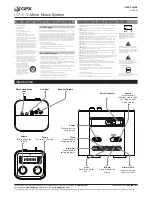
APP-III
Revision J2005-2
J-Type
11. Check that the fans are running (on back of PSU). If not, the PSU will overheat
and shut down, or will not provide full O/P capability. The fan can become stuck if
subjected to a hard knock - try to free the fan with the power turned OFF. If the
fan still does not come on, return the PSU to the factory.
12. If the PSU shuts down when connected to the console, check that each PSU-
block can deliver approximately 103A and start into 90A.
13. With the wire linking on the back of the PSU removed and the PSU disconnected
from any external loads, make sure that there is no reference to mains earth
from the ±18V rails.
;353#
´
46
9µ
#
VZLWFK
0
PRGH
#
SRZHU
#
VXSSO\
#
XQLW
The 8020 +13v/48v unit is based on one ADVANCE F20006 ‘power-block’, with addi-
tional circuitry as shown on CADAC drawing number C3.8016.
The a.c. input is connected to the PSU via a 3-core cable, CMA reference 3183TQ –
BASEC approved, rated at 20A.
Under no circumstances, should the 8020 PSU be used without a SAFETY EARTH
connection.
Failure to follow this instruction is both a fire and safety hazard.
5H
0
FDOLEUDWLQJ
#
D
#
´
46
9
27;
9µ
#
368
You will need CADAC drawings 8016 and 8023B.
TEST EQUIPMENT: Digital volt-meter, probe (must not be referenced to mains
earth), insulated adjustment tool.
WARNING! DO NOT remove cover unless you are qualified to service the parts
underneath it. UNDER NO CIRCUMSTANCES should anyone attempt to remove the
covers of the power blocks.
1.
Place the power supply on a flat surface and remove the top cover. Connect a
load to an O/P connector that is capable of drawing a current of 40A.
2.
Turn on the PSU and press the START button.
3.
Put probe on the 13V O/P cap and adjust the O/P adjuster on the 13V block until
the meter reads 13.00V ±0.05V.
4.
Move the probe either to TP1 and TP2 (0V) on the front panel mounted control
card 8023, or to PIN 8 and PIN 3 (0V) on the ‘D’-connector on the front panel.
Adjust the front panel mounted “offset adjust” pot (see figure 1-19) as close to
0.00V as possible.
5.
Connect a load to the 48V O/P pins capable of drawing a current of 600mA.
6.
Locate the 5568 BOARD, There is only one 5568 board used in the 448V PSU,
and this is mounted near the middle of the left hand side.
7.
Connect a digital volt-meter between the -V and +V terminals of the output
capacitor.
8.
On the 48V regulator card 5813, increase the output by turning the “O/P Voltage
Adjust” potentiometer, until the volt-meter reads 50V. Note that when the PSU
“trips”, the power switch must be turned off immediately. Turn the “O/P
Voltage Adjust” potentiometer on the 48V regulator card ‘down’ a few
turns, before you try again.
a) If the PSU “trips” at 50V (±0.5V), the 5568 is set correctly and no further cal-
ibration of the 5568 card is required.
b) If the PSU “trips” before you get to 50V, the 5568 card is set too low.
c)
If the PSU does not “trip” when you measure 50V, the 5568 is set too high.
Summary of Contents for J-Type
Page 1: ...Audio Mixing Console 056 6 10 n 95 4 1 07 g8 2...
Page 4: ...iv Table of contents J Type Revision J2005 2...
Page 6: ...vi General Precautions Revision J2005 2 J Type...
Page 8: ...viii Introduction J Type Revision J2005 2...
Page 72: ...3 22 7496 Dual Input Channel J Type Revision J2005 2...
Page 86: ...3 36 7830 Dual input channel J Type Revision J2005 2...
Page 96: ...4 10 7925 Programmable Group Module J Type Revision J2005 2...
Page 102: ...4 16 7972 Programmable Aux Groups Module J Type Revision J2005 2...
Page 110: ...4 24 7548 Programmable Routing Slave Mod Mk II J Type Revision J2005 2...
Page 146: ...6 14 7106 Quad Panning module J Type Revision J2005 2...
Page 154: ...7 8 6910 Oscillator PFL Stereo Aux module J Type Revision J2005 2...
Page 188: ...8 16 7956 DC Master Motor fader J Type Revision J2005 2...
Page 200: ...INDEX 4 J Type Revision J2005 2 W Wiring the switches 1 6 X XLR connections APP I...










































